What medicine could learn from Facebook stalking you
Listen
Emergency physician and researcher Raina Merchant heads University of Pennsylvania's social media and health innovation lab. (Paige Pfleger/WHYY)
If you look at your social media feeds, how many of your friends are quite forthcoming about their aches and pains, and experiences with illnesses?
Maybe they also share that they ate too much, drank too much, snuck a smoke, and forgot to take their medicine. Add to that all of those pictures of steaming bowls of salty Ramen noodles, or maps of miles jogged, and you make quite a few conclusions about their health.
Now – what if healthcare providers had access to all of this info?
Emergency physician and researcher Raina Merchant figured it wouldn’t hurt to ask patients if they’d be willing to give access to their accounts.
Merchant heads Penn’s social media and health innovation lab, and her research team asked a few thousand emergency room patients if they would grant access to both their social media sites and their electronic medical records. Over 70 percent of those who had social media accounts agreed.
“We were surprised,” said Merchant. “Patients told us ‘that’s interesting, I didn’t realize my social media site could tell you anything about my health.’ They were excited that in sharing this information they would contribute to a scientific data base.”
Merchant and her team did not friend people on Facebook, or follow them on Twitter. “We didn’t want to interfere with their normal behaviors,” she explained. Instead, they used an app that allowed them to gather information. Participants could see the info the app was collecting, and could remove it at any time.
After a few months, the researchers analyzed 12 million words that people had posted.
Merchant said some of the posts were very specific, and dealt with a condition like asthma.
“Somebody might say ‘my asthma is acting up today’ while other posts were more vague like ‘I’m not feeling well and can’t go to work.'”
Merchant said the opportunity in collecting and evaluating this data is in detecting patterns, and finding information that could reveal clues about the onset of diseases.
She said she could also envision a future where people could receive targeted messages and tips from healthcare providers on their social media feeds.
WHYY is your source for fact-based, in-depth journalism and information. As a nonprofit organization, we rely on financial support from readers like you. Please give today.




